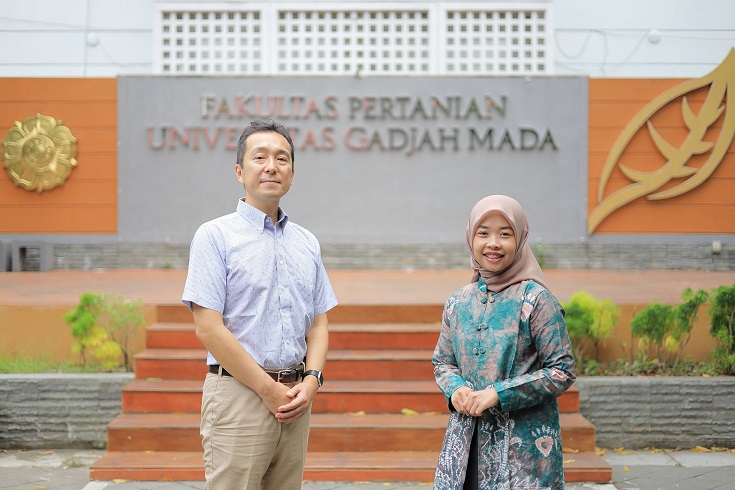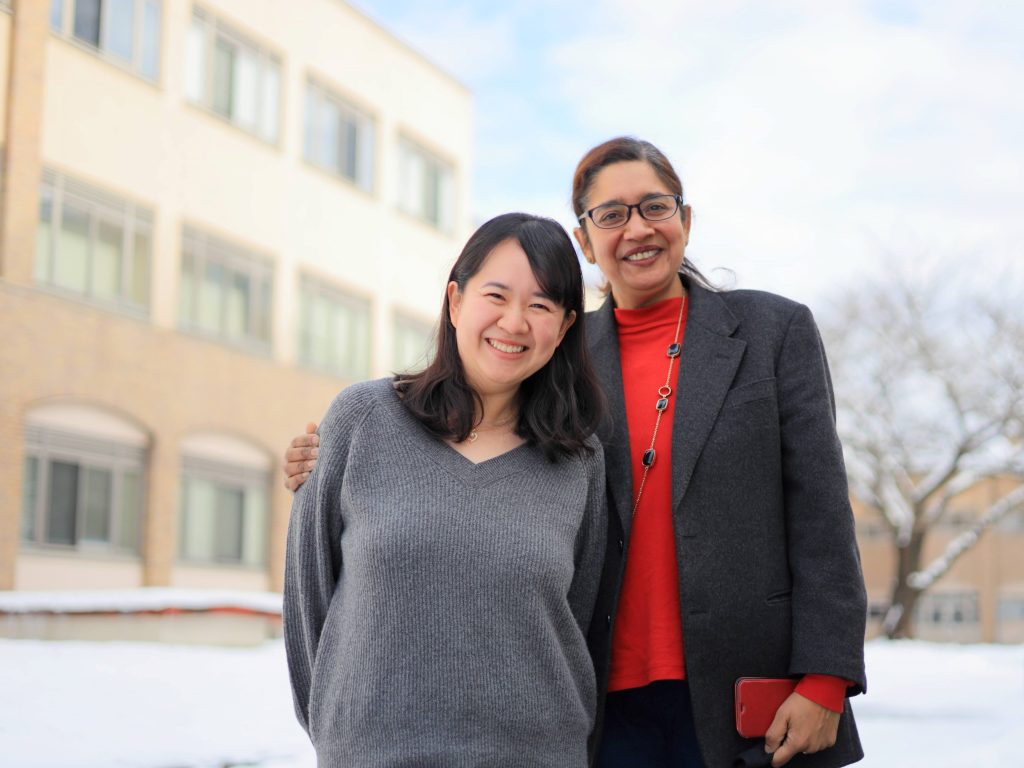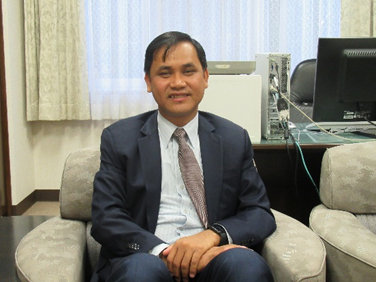Introduction to the UGAS Alumni
Speciality: Bioproduction Science, Biological Ecology Control
Dr. Tantriani (Year of completion: March 2024)
On November 27, 2024, Professor Koji Harashina, Associate Dean of the Iwate UGAS, interviewed Dr. Tantriani, an alumna of the UGAS, during his visit to Indonesia.
Dr. Tantriani received her degree in March 2024 under the supervision of Professor Keitaro Tawaraya (Yamagata University) and is currently working as a lecturer at Universitas Gadjah Mada in Indonesia.

- What motivated you to enroll at Iwate UGAS?
After completing my undergraduate studies at Universitas Gadjah Mada in Indonesia, I knew I wanted to pursue advanced studies in Japan, where I could experience cutting-edge research environments and a unique academic culture. Iwate UGAS stood out to me due to its strong network of professors, its interdisciplinary research opportunities, and the alignment of its educational programs with my research interests, particularly in the fields of plant sciences, metabolomics, and microbiomes. I had previously worked closely with my advisor on research topics related to phosphorus tolerance in plants, and I felt Iwate UGAS would provide the ideal setting to continue this work and tackle new scientific challenges. - What kind of research did you conduct during your time as a student at UGAS?
While at Iwate UGAS, I concentrated my research on uncovering the mechanisms behind phosphorus tolerance in soybean cultivars. This involved screening various soybean cultivars from Japan’s core collections under phosphorus-deficient conditions and studying their adaptation mechanisms through both hydroponic and soil culture experiments. I used metabolomic and microbiome techniques to analyze plant responses at the molecular level, examining root exudates and rhizosphere metabolites. Additionally, I explored plant-microbe interactions through bioinformatics, which helped uncover critical insights into how soybeans respond in phosphorus-limited environments. - What is your most memorable experience from your time at Iwate UGAS?
One of the most unforgettable moments was when I received the Teru Takanohashi Award for being an outstanding female researcher, as well as the UGAS Excellent Award for my performance and contributions to research. These recognitions, alongside the opportunity to intern at the University of Saskatchewan in Canada, were highlights of my academic journey. The internship allowed me to deepen my expertise in bioinformatics and microbiome analysis, and it was also a significant personal achievement since it marked my second visit to Canada after attending a conference there earlier in my career. - What do you feel was the best thing about studying at Iwate UGAS?
The best part about studying at Iwate UGAS was the exceptional mentorship I received from my professors. Their dedication extended far beyond academics; they were genuinely concerned with my personal and professional development. The opportunity to collaborate with experts in my field and to interact with students from diverse disciplines helped me grow not only as a researcher but also as a global citizen. Additionally, the advanced facilities and research resources at Iwate UGAS played a critical role in enabling me to publish three papers as the first author in prestigious international journals. - As an international student, studying in Japan must have been challenging. What was the most difficult part for you, and do you have any advice for other international students?
One of the most challenging aspects was the limited interaction with Ph.D. students from other fields, which could have offered more opportunities for interdisciplinary learning. Additionally, language barriers sometimes made it difficult to fully capture the nuances of discussions with professors. My advice to future international students is to embrace the challenges of language and culture as part of the learning process. Building strong relationships with peers, actively participating in seminars, and seeking guidance when needed will make the experience much more rewarding. - Is there anything you wish you had done more of during your time at Iwate UGAS? Do you have any advice for your juniors?
I wish I had spent more time engaging in discussions and collaborations with students from other departments. These interactions could have broadened my perspectives and opened new avenues for research. For my juniors, I encourage you to take advantage of every networking opportunity and not hesitate to ask for advice or assistance when you face challenges. Stay focused, be resilient, and remember that the journey of research is as much about personal growth as it is about your academic success. - After graduating from Iwate UGAS, you have been active at a university in your home country. What kind of work are you currently engaged in, and is there anything you learned at Iwate UGAS that has been particularly useful?
Currently, I am a faculty member at Universitas Gadjah Mada in the Department of Soil Science. My work involves teaching, mentoring undergraduate and graduate students, and conducting research. The interdisciplinary skills I developed at Iwate UGAS, especially in metabolomics, microbiome analysis, and bioinformatics, have been extremely valuable in my current research. - Where do you see yourself in 5 or 10 years?
In the next 10 years, I envision myself advancing to the position of a full professor, making significant contributions to the field of agriculture, and establishing a robust research group. I also aim to collaborate on international projects that address global challenges like climate change and food security, while continuing to mentor young scientists in the academic community. - Finally, do you have any messages for juniors currently striving to earn their doctoral degrees?
Stay resilient, and keep pushing forward, even when things get tough. If you face challenges, whether in research, academics, or personal life, don’t be afraid to seek help from those you trust. Use each obstacle as an opportunity to reflect and grow stronger. The journey is long, but it is filled with invaluable lessons. Always remember to stay curious, take pride in your progress, and strive to make a positive impact on the world around you.
(November, 2024)
Specialty: Bioproduction Sciences, Animal Production
Dr. EMURA, Natsuko (Year of completion: March 2021)
With great pleasure, we welcomed Dr. Emura Natsuko, an alumna of Iwate UGAS. In March 2021, Dr. Emura availed her Ph.D. degree in Animal Production specialty from the United Graduate School of Agricultural Sciences (Iwate UGAS) under the supervision of Professor Sawai Ken. On December 21, 2022, Dr. Emura visited Iwate UGAS and shared the journey of her research career.

Since May 2021, Dr. Emura is working as a Postdoctoral Research Fellow in the Brown University, U.S.A., which is an Ivy League University, a place for world-renowned faculties and also an innovative educational institution. Her field of research is Molecular and Developmental Biology in Animal sciences.
Ascending from Tokushima Prefecture, Dr. Emura finished her undergraduate and graduate studies at Iwate University, she shared her experience during her student life with us. In her words, the journey at Iwate University was ‘Half-pleasure’ and ‘Half-frustration’. Although she published 3 scientific publications as a first author during her PhD. studies, which is an amazing achievement, she wanted to publish another research article which she could not finish on time.
She found her current job at Brown University through the JREC-IN Portal (a job posting site in Japan). Side by side, she also got another job at a national university in Japan but decided to take the job at the Brown University in the U.S.A. Dr. Emura encourages all Japanese students as well as the foreign students at UGAS to try to extend their research abroad in order to get more experience. She also suggested the students to open their horizon and try to work abroad for a better career. Of course, it was not so easy to get a job after Ph.D. While job hunting, she said it was difficult for her to find a good postdoctoral position. She is grateful to UGAS and said it would be more helpful if UGAS could assist and support the students in job hunting.
Dr. Emura has many good memories in Iwate. She enjoyed Sansa dance during her stay, enjoyed campus life and had many friends. Regarding the lectures at UGAS, she said she had to take the courses to get the required credits but among them she loved the Science Communication in English course and Science Communication Camp the most.
In Japan, although it is very common to go abroad for studies from Universities like Tokyo University or Osaka University etc., it is very rare to get a job after graduating from a Local National University (i.e. Iwate University). With her hard work and efforts, Dr. Emura achieved a competitive position abroad. Dr. Emura will continue her research in the same laboratory till 2025 and will gradually look for a faculty position. We sincerely thank Dr. Emura for justifying the years spent by her at Iwate UGAS. We wish her success, a bright career and a happy life. We hope that all of our UGAS students will be encouraged by her hard work and have a wonderful career ahead.
Interviewed by: Dr. Arifa Rahman, Iwate University
(2022.12)
Specialty: Bioproduction Sciences
Dr. Mam Amnot (Year of completion: March, 2008)

- I think it’s been a long time since you came to Iwate, but please tell us about your impression of Iwate after a long time.
Iwate used to be my home. It was a quiet town and still I felt that compared to Tokyo or Sendai, it’s a nice quiet town. I feel very good to be back after 11 years. I felt quite nostalgic. - Please tell us why you decided to study in Japan.
I always had a dream to go abroad and study. I graduated from National institute of Management in Cambodia; then applied and got a scholarship to come to Japan as a research student. Afterwards, I applied for Monbusho Scholarship and finished my Masters in Tohoku University and later on, came to Morioka and achieved my PhD. Degree from Iwate UGAS. So, I guess my dream to study abroad was the reason to come to Japan. - Is there any reason for choosing Iwate University?
Since I did my Masters in Tohoku University under the supervision of Professor Kuita, I was tempted to do my Ph.D. in Tohoku University. I did not have much knowledge about Japan or its education system as well as the living style. I wanted to study Economics, especially on macroeconomics. I wanted to get a scholarship and study in Japan. So, I searched the internet; I tried to learn about Japanese education system and Japanese culture. While searching in the net, I found Iwate University. During my Ph.D. study I wanted to know more about the livelihood of rural farmers in Japan. I did not have much time to explore many places. So, I thought Iwate might be a better choice for me and I applied for Monbusho Scholarship under Professor Shinnosuke Tama as my major supervisor. Luckily, I received the Scholarship. When I first visited Iwate, I was very impressed about its natural beauty. I liked this place instantly and this is how I chose Iwate University. - What kind of research were you doing during your studies?
I studied on the economic development of rural farmers in Cambodia. Analyzing the living style and economic background of Japanese farmers, I tried to implement the suitable factors to improve my country’s economic infrastructure. For this reason, I collected data in rural areas of Japan and also I had to travel to collect data in Cambodia at least twice a year. - Which courses did you like the most?
I attended many lectures, conferences, Seminars. There were many courses on several topics. But I liked to join the conferences to get ideas and new topics to study and improve my research the most. - What is the most memorable thing when you were a student?
I was the only Cambodian student in Iwate University during my stay. I was not good in Japanese language and did not talk to anyone except for another student from Haiti. I did not like the cold winter of Iwate as well. During my first year of study, I was very lonely, became very stressed and quite sick. I went to the University health center who recommended me a doctor and the physician recommended me to go and visit my hometown. This worked very well and after coming back to Japan from Cambodia, I enjoyed my life here. I was lucky to have a “Japanese Mother” (Okasan) who took me to many places to visit. That was a tough time for me and I think that’s the most memorable time that I remember as a student. - What did you think of the Campus and Extracurricular activities?
I was not very social so I did not socialize with others in the campus. I did not join any circle or sports club. I needed to change; luckily, I had a Japanese mother who really helped me. With her, I went to many places, visited many people, went to the mountain, enjoyed Japanese food, culture, festivals etc. - How did the University prepare you for your career i.e. The contribution/effect of Iwate UGAS in your career?
Everybody here at Iwate University was very helpful and cooperative. I could avail all facilities with no trouble. My supervisor even gave me a card for printing so that I could print any document for my research anytime. Due to my lack of Japanese language, it was very challenging for me to collect data, but with the help of my supervisor and others, I could finish my PhD studies and now established my career.
I believe in 3 words that contributed in my career: Challenging
Life in Iwate was very lonely in the beginning due to my lack of Japanese language.
Rewarding
With the help of Iwate University I got the reward of Ph.D. degree.
Promotion
My educational background and my experience in Japan helped me to come to this current position. After finishing my Ph.D., I became the personal assistant of the honorable Prime Minister of Cambodia, and in 2013 the Prime Minister of Cambodia gave me the honor to become the “Secretary of State”, Ministry of Agriculture Forestry and Fisheries. - Please let us know if there is a request to Iwate University, such as wishing to have this while studying.
During my stay, I used to go to the Library at Iwate University a lot. But I felt a lack of English books there. I think the University should have more English books in all fields and also make arrangement for translated copies of important Japanese Books in Agriculture major.
The foreign students do not get much time to learn Japanese language along with their research. If there are more facilities so that the foreign students can communicate well in English, it will be very helpful for them.
The University can think to broaden the perspective of learning English with compulsory curriculums. If the faculties and administrative authorities can communicate in English, it will be great. I am sure this will definitely attract more foreign students to come and study at Iwate University. - Do you have any advice to the foreigners who are considering studying abroad in Japan?
I am proud of Iwate UGAS. I recommend this University to all foreign students. The university has most of the facilities. I think if the students prepare themselves before coming to Japan it will be very helpful for them. I would suggest them to learn a little Japanese language before coming so that they can communicate well during their studies. - Please tell us about your current work in Cambodia.
Currently I am the Secretary of State in the Ministry of Agriculture Forestry and Fisheries. I focus on improving the land area of Cambodia, improve the households, tackle the climate change calamities and try to support the farmers. I have 3 main motives; 1) Attending various job related meetings, conferences, 2) Meet people in the rural areas, listen and talk to them face to face, and 3) Come abroad; collaborating with international organizations like Food and Agriculture Organization of the United Nation (FAO), World Food Association (WFA) etc. to avail ideas for developmental implementation in my country.
My boss always said “Try not to have Six legs in Office” meaning that you should not always sit on your desk but move around and do your job. I believe in these words and try to work hard. - How did you get your current job?
After finishing my PhD. I went back to my country; my dream came true. The Prime Minister of Cambodia offered me a position as his personal assistant, and gradually in 2013, I became the Secretary of State in the Ministry of Agriculture Forestry and Fisheries. - Please tell us about your future goals. Also, if you have any advice for Iwate UGAS students, please share them with us.
I have 2 sons who are 9 years old and are twins. My future goal is to make my sons “Better than Me”. I want to make a good platform for them, for the next generation and thus make a better future for them.
Date: November 13, 2019
Place: Iwate UGAS Graduate School Dean’s Office



